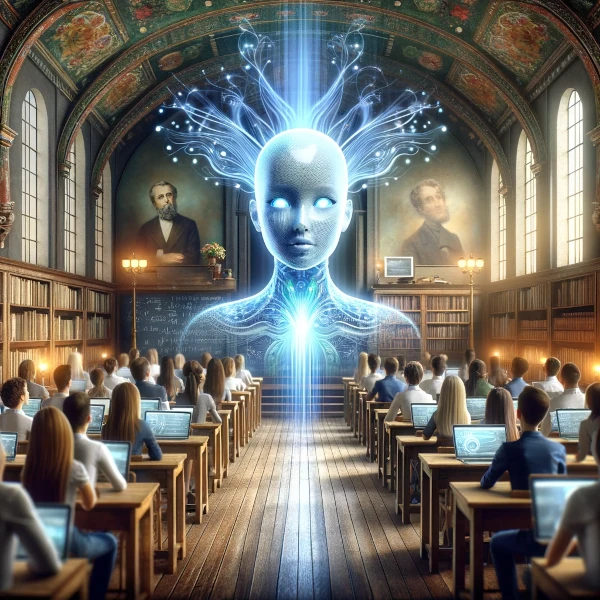Higher education, once a sanctuary of critical thought and intellectual exploration, has found itself entangled in the seductive web of neo-liberalism. This ideology, with its emphasis on competition, efficiency, and market-driven values, has infiltrated the hallowed halls of academia, subtly reshaping the landscape of teaching, research, and the very purpose of the university itself. This article argues that the seductive whispers of neo-liberalism have led to a profound transformation of the academic landscape, one that prioritizes branding and profit over holistic education, and ultimately threatens to replace the human professor with the cold efficiency of Generative AI.
A Brief History
The seduction began with the promise of increased funding and autonomy. Universities, enticed by the allure of competition, embraced the business model, transforming themselves into corporate entities vying for market share and student dollars (Marginson, 2016). This shift in focus led to the prioritization of branding and marketing, with universities crafting carefully curated images to attract students and donors, often at the expense of academic rigor and intellectual diversity (Slaughter & Leslie, 2013).
The Seduction
Professors, caught in this seductive tide, competing for the prestige of a higher h-index, found themselves increasingly pressured to conform to the demands of the corporate university. The focus narrowed to two key metrics: course delivery and research. The former, driven by student satisfaction surveys and standardized testing, became a matter of efficient content transmission, reducing professors to mere dispensers of knowledge (Giroux, 2020). The latter, fueled by the pressure to secure grants and publish in prestigious journals, often prioritized institutional branding, marketability, and commercial relevance over genuine intellectual inquiry (Marginson, 2016).
The Role of the Professor
This narrowing of focus had a profound impact on the traditional role of the professor. The vital mentoring functions, such as academic advising, career guidance, and personal development, were increasingly delegated to administrative staff, further distancing professors from their students (Bok, 2013). This not only eroded the sense of community and intellectual engagement within the university but also undermined the crucial role of the professor as a role model and mentor.
Generative AI
The seduction of neo-liberalism, however, seems to be reaching its apex with the rise of Generative AI. This technology promises to automate course delivery, potentially rendering human professors obsolete. While AI can undoubtedly offer valuable tools for education, its potential to dislodge the irreplaceable human element – critical thinking, intellectual discourse, and the fostering of human connection – should not be underestimated (Bostrom, 2014).
WILL AI MAKE the corporate university professor redundant?
A university devoid of its human heart, where professors are mere cogs in a profit-driven machine and students are treated as consumers, risks losing its very essence. Education becomes a mere transaction, devoid of the transformative power of human bonding, critical thought, intellectual exploration, and the nurturing of well-rounded individuals.
As AI has demonstrated its prowess to provide adaptive individualized tutoring and testing (Alam, 2021), plus a capability to generate articles (Lee, 2023), it seems the very tasks of a corporate university professor are in jeopardy of being automated.
The consequences of succumbing entirely to the neo-liberal seduction are actually more dire: Generative AI has the promise to replace the corporate university professor.

Moreover, there is much incentive to do so. Rising education costs consistently outpace general inflation (Edel, 2013), with the current student loan debt in the United States reaching 1.7 Trillion Dollars. The promises of high returns lure many a Silicon Valley companies to try their hand in adaptive-customized-automated-personal learning environments, complete with virtual reality add-ons, where you can take Physics 101 from a holographic Mr Newton himself.
Rising to the Challenge
If the future university is to retain human professors, it is imperative to resist the seductive whispers of neo-liberalism and reclaim the true purpose of the university beyond mechanisms of job-ready skill acquisition. We must reassert the value of the human professor, not as a delivery mechanism or research tool, but as a guide, an inspiration, and a weaver of knowledge and character. We must reframe the academic landscape as a space for critical inquiry and intellectual engagement, not a marketplace for brands and profits. And we must harness the power of AI not as a replacement for human educators, but as a tool to amplify their unique abilities.
The future of the university hangs in the balance. Will we succumb to the seductive whispers of neo-liberalism and witness the rise of the corporate university, devoid of its human soul? Or will we reclaim the true purpose of education and build a future where AI dances not with the serpent of efficiency, but with the human spirit, amplifying the transformative power of education in all its messy, beautiful complexity? The choice is ours — but at the least, urgent debate is imperative.
References
Alam, A. (2021). Should Robots Replace Teachers? Mobilisation of AI and Learning Analytics in Education’, 2021 International Conference on Advances in Computing, Communication, and Control (ICAC3).
Bok, D. (2013). Higher education in America. Princeton University Press.
Bostrom, N. (2014). Superintelligence: Paths, dangers, strategies. Oxford University Press.
Edel, J.N. (2013). The Pyrrhic Victory of American Higher Education: Bubbles, Lemons, and Revolution. Notre Dame Law Review, 88, 1543.
Giroux, H. A. (2020). On critical pedagogy. Bloomsbury Publishing.
Lee, J. Y. (2023). Can an artificial intelligence chatbot be the author of a scholarly article? Science Editing, 10(1), 7-12.
Marginson, S. (2016). Higher Education and the Common Good, Melbourne University Press.
Slaughter, S., & Leslie, L. (2013). Academic Capitalism and the New Economy: Markets, State, and Higher Education. Johns Hopkins University Press.

